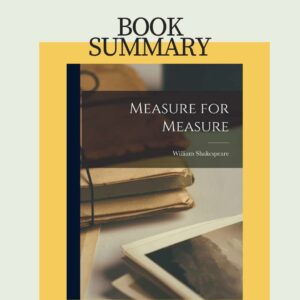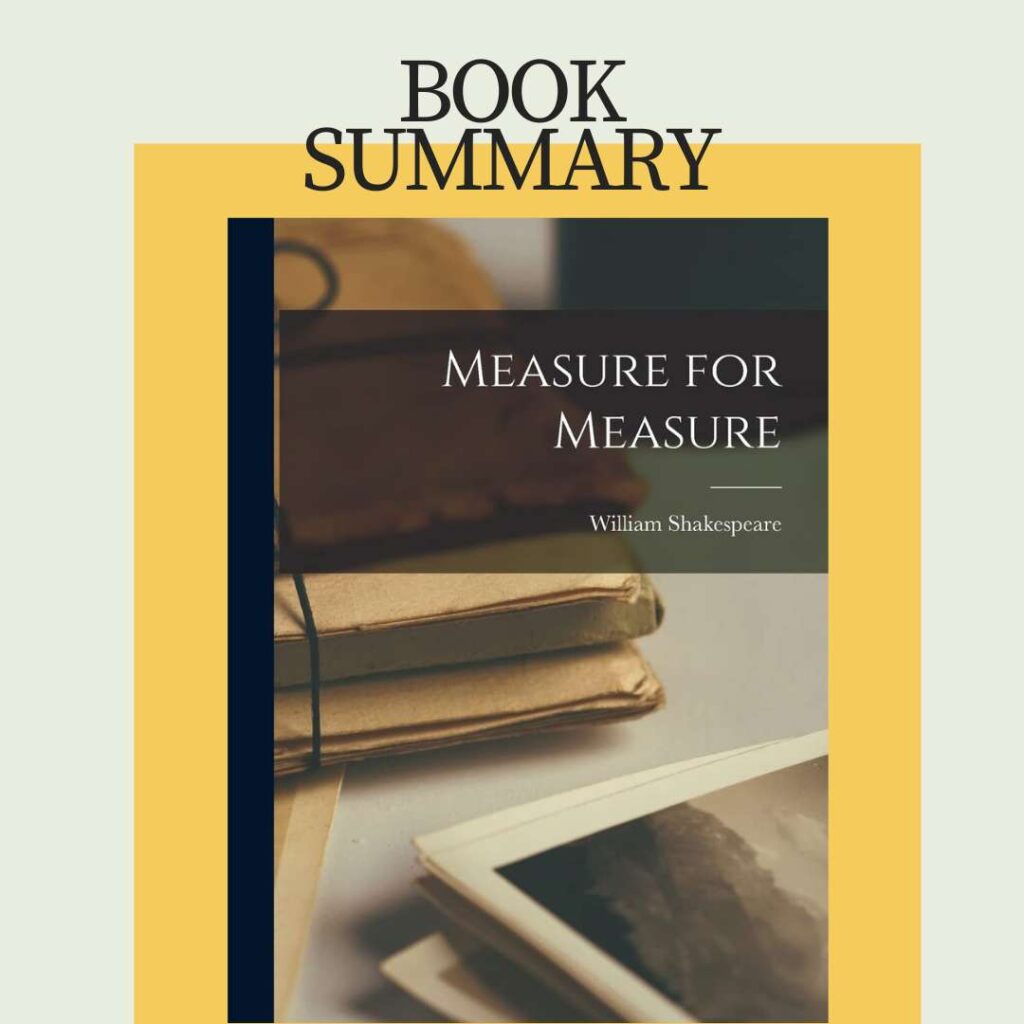Measure for measure summary
Measure for Measure, a play written by renowned playwright William Shakespeare, is a profound exploration of morality, justice, and power dynamics. Set in the city of Vienna, this play delves into the complexities of human behavior and societal norms, challenging the audience to reflect on the nature of right and wrong.
The Playwright: William Shakespeare
- William Shakespeare, often regarded as the greatest playwright in the English language, was a prominent figure in the Elizabethan era.
- Known for his exceptional ability to capture the human experience in his works, Shakespeare crafted numerous plays that continue to resonate with audiences worldwide.
- Measure for Measure is one of Shakespeare’s lesser-known works, yet it is a masterpiece that showcases his unparalleled talent in weaving intricate plots and bringing complex characters to life.

Table of Contents
The Setting: Vienna
- Vienna, the backdrop of Measure for Measure, serves as a symbolic representation of a city embroiled in moral decay and corruption.
- Within the city walls of Vienna, Shakespeare unfolds a narrative rich with themes of deception, redemption, and the relentless pursuit of justice.
- The contrast between the external opulence of Vienna and the underlying moral decadence highlights the underlying tensions that drive the characters’ actions.
Exploring the Plot of Measure for Measure
Act I Summary
In Act I of Measure for Measure, the Duke of Vienna temporarily hands over power to Angelo, a strict deputy, to enforce the laws rigorously. The key characters introduced include Claudio, who has been sentenced to death for impregnating his fiancée Juliet, and Isabella, Claudio’s sister. The conflict arises when Isabella pleads with Angelo to spare Claudio’s life, yet Angelo makes a shocking proposition that tests her morality.
Acts II & III Summary
Act II delves deeper into the plot as Angelo’s self-righteous facade begins to crumble when he becomes infatuated with Isabella. He offers Claudio’s life in exchange for her virginity, putting her in a moral dilemma. Meanwhile, the disguised Duke observes and manipulates events behind the scenes, setting up a complex web of deceit and revelations.
Act III intensifies the drama as Angelo double-crosses Isabella and orders Claudio’s execution despite promising clemency. The tension escalates as the Duke schemes to expose Angelo’s transgressions and enact justice on behalf of the oppressed.
Act IV and V Summary
Act IV sees the climactic unraveling of deceptions and the revelation of the Duke’s true identity. The complicated interplay of power, virtue, and mercy reaches its peak as the characters confront the consequences of their actions. Themes of forgiveness and redemption come to the forefront, leading to a resolution that questions the nature of justice and morality.
Act V culminates in a series of revelations and reconciliations, with characters grappling with the aftermath of their choices. The play concludes with a nuanced exploration of power dynamics, ethical dilemmas, and the complexities of human nature.
Major Themes
Measure for Measure tackles profound themes such as justice, mercy, morality, and deception. The play intricately weaves together contrasting ideas of virtue and vice, highlighting the blurred lines between right and wrong. Shakespeare masterfully explores the human condition through the lens of power dynamics and ethical quandaries, inviting reflection on the complexities of moral decision-making and the consequences of one’s actions.
Relevance and Impact
The timeless themes of Measure for Measure continue to resonate with modern audiences, offering a rich tapestry of moral dilemmas and ethical contemplation. The play’s exploration of power struggles, corruption, and redemption remains poignant in today’s world, inviting introspection into the nature of justice and forgiveness. Measure for Measure serves as a compelling reflection on societal norms and individual responsibility, prompting viewers to consider the enduring relevance of Shakespeare’s profound insights.
Critical Reception
Critics have praised Measure for Measure for its intricate plot, multifaceted characters, and thematic depth. The play’s exploration of moral ambiguity and the complexities of human behavior has sparked diverse interpretations and critical analyses. Scholars have lauded Shakespeare’s skillful blending of comedy and tragedy, as well as his nuanced portrayal of societal issues such as power dynamics and moral rectitude. Measure for Measure continues to captivate audiences and provoke thought-provoking discussions on the nature of justice, redemption, and the human conscience.
Frequently Asked Questions (FAQs) About Measure for Measure:
What is the main message of Measure for Measure?
The main message of Measure for Measure revolves around themes of justice, morality, forgiveness, and power, showcasing the complexities of human nature and societal norms.
Who are the main characters in Measure for Measure?
The main characters in Measure for Measure include Duke Vincentio, Isabella, Angelo, Claudio, and Escalus, each contributing to the intricate plot and thematic development of the play.
How does Measure for Measure explore the concept of redemption?
Measure for Measure explores the concept of redemption through characters like Angelo and Isabella, displaying the potential for transformation and forgiveness amidst moral dilemmas.
What role does the setting of Vienna play in Measure for Measure?
The setting of Vienna in Measure for Measure serves as a backdrop for exploring themes of corruption, justice, and authority, shaping the actions and outcomes of the characters in the play.
What are some major themes in Measure for Measure?
Major themes in Measure for Measure include the abuse of power, the nature of justice, the conflict between law and morality, and the complexities of human virtue and vice.
Conclusion:
In conclusion, Measure for Measure by William Shakespeare presents a thought-provoking examination of human nature, morality, and justice through its rich characters and intricate plot. The play’s exploration of themes such as redemption, power, and forgiveness continues to resonate with audiences today, showcasing Shakespeare’s enduring relevance in addressing timeless moral dilemmas. By delving into the complexities of societal norms and personal struggles, Measure for Measure stands as a testament to the enduring legacy of one of the greatest playwrights in history.
Discover marketing services, interviews & publishing tools at SharingStories.


